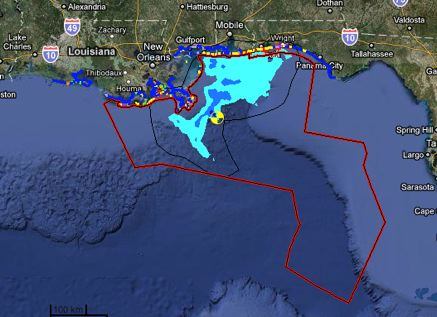BP Plc (BP/) and the lead lawyers representing victims of the 2010 Gulf of Mexico oil spill urged a judge to approve a proposed $7.8 billion partial settlement of claims, while attorneys for thousands of plaintiffs sought rejection or modification of the agreement.
In a separate courtroom in New Orleans, a second federal judge yesterday rejected a bid by a former BP engineer to dismiss one of two criminal charges related to estimates on the size of the spill. Kurt Mix, who has pleaded not guilty, was charged with obstruction of justice for allegedly deleting text- message strings from his mobile phone.
BP, based in London, reached the $7.8 billion settlement in March to resolve most private plaintiffs' claims for economic loss, property damage and injuries related to the explosion of the Deepwater Horizon oil rig and subsequent spill. U.S. District Judge Carl Barbier, who granted preliminary approval to the settlement in May, is considering arguments on the agreement at a fairness hearing that started yesterday in New Orleans.
 |
| A visual image of the BP oil spill |
The BP settlement underpays some claimants and unfairly excludes others, lawyers for the objectors said in court papers before yesterday's hearing. Lawyers representing more than 13,000 spill victims have attacked the settlement's fairness, BP said in a filing last month seeking approval from the judge.
"Two identical businesses across the street from each other received dramatically different" settlement offers based on the deal's terms, Stuart Smith, a lawyer for Florida business owners objecting to the accord, said at yesterday's hearing. "It doesn't make any sense and it isn't fair."
‘
Not Affected'
Barbier began yesterday's hearing by noting many objectors to the settlement don't have the right to challenge the accord.
"If you are excluded from the settlements, your rights are not affected," the judge said at the hearing yesterday. Barbier said spill victims not covered by the accord can press ahead with their claims in court. "If you are excluded, you have no legal standing to object to the settlement."
The accord will resolve more than 100,000 damage claims tied to the spill, plaintiffs' attorney James Roy told the judge yesterday while urging him to approve the agreement.
The claims process set up after the settlement was announced has already paid out more than $1 billion, before final approval, said Roy, co-lead attorney on the plaintiffs' steering committee, which has pursued the litigation against BP.
The BP settlement "was a hard-fought negotiation. Nothing was easy," Roy said. "This is not a group of insurance adjusters trying to save money for BP."
Settlement Familiarity
Given Barbier's familiarity with the spill settlement and the requirements of U.S. maritime law, he'll probably approve the accord after giving people a chance to have their say about it, said Carl Tobias, who teaches complex litigation law at the University of Richmond in Virginia.
"I'd say the chances are pretty good that the settlement will win the judge's final approval," Tobias said in a phone interview. "He's lived with this case for more than two years and he's familiar with all the intricacies of this deal."
After Barbier gives the settlement his stamp of approval, spill victims who aren't included in the settlement probably will appeal, Tobias said. There's little chance that a federal appeals court in New Orleans will find fault with Barbier's handling of the spill settlement, he added.
Appellate judges often show great deference to their colleagues assigned to oversee complicated class-action cases spawned by disasters like the Deepwater Horizon spill, he said.
Experience, Expertise
"These judges have been appointed because of their great experience and expertise with the type of case they are handling," Tobias said. "The appeals courts are generally loathe to overturn the decisions they've made."
The blowout and explosion aboard the Deepwater Horizon drilling rig in April 2010 killed 11 workers and started millions of barrels of crude leaking into the gulf. The accident prompted hundreds of lawsuits against BP; Transocean Ltd. (RIG), the Vernier, Switzerland-based owner and operator of the rig; and Halliburton Co. (HAL), which provided cementing services.
BP's proposed partial settlement of private claims was reached March 2, days before a trial on liability for the spill. The settlement establishes two separate classes, one for economic loss and the other for physical injuries related to the spill or the cleanup. BP estimates the settlement, which is uncapped, is worth about $7.8 billion.
Claims Excluded
The settlement excluded claims of financial institutions, casinos, private plaintiffs in parts of Florida and Texas, and residents and businesses claiming harm from the Obama administration's moratorium on deep-water drilling prompted by the spill. It also doesn't cover federal government claims and those of Gulf Coast states Louisiana and Alabama, or lawsuits against co-defendants.
 |
| The worst maritime oil spill in history in the Gulf of Mexico |
The U.S. sued BP, Transocean and BP's partners in the well, Mitsui & Co. (8031)'s MOEX Offshore 2007 and The Woodlands, Texas-based Anadarko Petroleum Corp. (APC), alleging violations of federal pollution laws. MOEX has settled the federal claims.
BP has been in negotiations with the U.S. Justice Department to settle the federal claims as well, the company said in an Oct. 30 regulatory filing. BP has provisioned about $38.1 billion for spill costs and has paid more than $8 billion in compensation to individuals, businesses and government entities so far.
‘
Full Compensation'
BP faces a potential $17 billion fine by the U.S. under Clean Water Act provisions, should it be found grossly negligent for the spill. The issue of gross negligence will be determined at a nonjury trial over liability for the explosion of the Deepwater Horizon drilling and the subsequent oil spill now set for Feb. 25 before Barbier in New Orleans.
BP has urged Barbier to grant final approval to the settlement, arguing in a court filing last month that the agreement "will bring full compensation to all class members, including those on the Gulf Coast, while resolving a major component of the Deepwater Horizon litigation."
The objectors represent "only a small fraction of the total class members," the company said.
Many of the objections to the settlement have been brought by people or businesses that were excluded from the agreement reached in March, Stephen Herman and Roy, lawyers for the plaintiffs, said in a separate filing last month.
Even if claims were brought to trial and BP was found to be grossly negligent, pursuing individual lawsuits instead of resolving them through a mass settlement would take years, Herman and Roy said.
‘
Take Decades'
"No one can deny that these could take decades to resolve conclusively through litigation," they wrote.
Smith, who represents business owners in Destin, Florida, argued yesterday that the zones created to assess economic damages are "flawed and inherently unfair" and should be redrawn.
"The economic loss zones were hotly debated," Richard Godfrey, a lawyer representing BP, told Barbier. The zones were based on where businesses and properties were located in relationship to the Gulf's beaches, Godfrey said. Local experts were drafted to review zone-placement decisions, he added.
Barbier noted that he doesn't have the legal power to alter the settlement, but only has authority to "approve or disapprove" the deal.
The judge also questioned objectors' claims that attorneys who helped craft the settlement colluded with BP to hold down the value of accord. Barbier said those allegations "strike me as incredible."
Commercial Fishermen
Joe Waltzer, a lawyer representing commercial fishermen damaged by the spill, said the $2.3 billion set aside to compensate his clients is not being paid out fairly.
Fishermen, crabbers and oystermen are getting "very little in the way of income-replacement payments," Waltzer told Barbier. "We want to make sure there is adequate compensation" for all who make a living harvesting fish from the gulf, he added.
Other objectors focused on problems with the medical- benefits portion of the settlement.
The state of Louisiana has also objected to the agreement, contending in a filing in September that the terms "fail to fully compensate victims for the extensive damages already suffered as a result of the spill, and for the damages that are likely to occur in the future."
Louisiana's lawyers won't be speaking at the hearing because the state wasn't part of the settlement.
Criminal Case
In the criminal case, the only one so far arising from the incident, the defendant asked U.S. District Judge Stanwood Duval yesterday to dismiss one of the counts.
The former engineer worked on internal BP efforts to estimate the amount of oil leaking from the Macondo well. The government alleges that Mix destroyed evidence the U.S. was seeking for its investigation of the spill.
The two counts of the indictment concern text messages between him and a contractor and another string with his supervisor. Mix asked Duval to dismiss the second count, covering 182 messages to the contractor, before trial as a matter of law because the content of the texts was "patently innocuous."
The issue should be determined by a jury, U.S. District Judge Stanwood Duval said at a hearing in New Orleans yesterday. Many of the texts appeared innocuous, while "others might have meaning which the court can't divine now." Duval said.
‘
Last Person'
Mix, who has pleaded not guilty, faces a Feb. 25 trial. Duval said yesterday he may change the date.
"He's the last person who deserves to be sitting in this courtroom on obstruction of justice charges," McPhee told the judge at yesterday's hearing. "Count two can and should be dismissed now."
Mix knew he wasn't supposed to delete anything as the U.S. investigated the 2010 incident, prosecutor Richard Pickens told the court yesterday.
"The only issue before the court is whether he had a wrongful purpose," Pickens said. "Simply denying a grand jury the opportunity to examine whether or not material was relevant -- that's obstruction. It's just that simple."
The civil case is In re Oil Spill by the Oil Rig Deepwater Horizon in the Gulf of Mexico on April 20, 2010, MDL-2179, U.S. District Court, Eastern District of Louisiana (New Orleans). The criminal case is U.S. v. Mix, 12-cr-00171, U.S. District Court, Eastern District of Louisiana (New Orleans).
By
Margaret Cronin Fisk, mcfisk@bloomberg.net and
Jef Feeley, jfeeley@bloomberg.net
Source:
The Businessweek
















